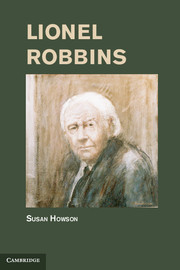Book contents
- Frontmatter
- Contents
- Illustrations
- Abbreviations
- Introduction
- One Father and Son
- Two The Great War
- Three Postwar
- Four The London School of Economics
- Five Iris Gardiner
- Six New College Oxford
- Seven The Young Professor
- Eight Fritz and Lionel
- Nine The School in the Mid-1930s
- Ten The Approach of War
- Eleven The Economics of War
- Twelve Director of the Economic Section
- Thirteen Anglo-American Conversations
- Fourteen The Law Mission and the Steering Committee
- Fifteen 1 9 4 4
- Sixteen The Last Months of the War
- Seventeen The Postwar Settlement
- Eighteen Return to the School
- Nineteen The End of the Transition
- Twenty LSE in the Early 1950s
- Twenty-One Chairman of the National Gallery
- Twenty-two Lord Robbins
- Twenty-three The Robbins Report
- Twenty-four The Sixties
- Twenty-five The Arts
- Twenty-six The Troubles at LSE
- Twenty-seven Retirement
- Conclusion
- Bibliography
- Index
Nine - The School in the Mid-1930s
Published online by Cambridge University Press: 07 October 2011
- Frontmatter
- Contents
- Illustrations
- Abbreviations
- Introduction
- One Father and Son
- Two The Great War
- Three Postwar
- Four The London School of Economics
- Five Iris Gardiner
- Six New College Oxford
- Seven The Young Professor
- Eight Fritz and Lionel
- Nine The School in the Mid-1930s
- Ten The Approach of War
- Eleven The Economics of War
- Twelve Director of the Economic Section
- Thirteen Anglo-American Conversations
- Fourteen The Law Mission and the Steering Committee
- Fifteen 1 9 4 4
- Sixteen The Last Months of the War
- Seventeen The Postwar Settlement
- Eighteen Return to the School
- Nineteen The End of the Transition
- Twenty LSE in the Early 1950s
- Twenty-One Chairman of the National Gallery
- Twenty-two Lord Robbins
- Twenty-three The Robbins Report
- Twenty-four The Sixties
- Twenty-five The Arts
- Twenty-six The Troubles at LSE
- Twenty-seven Retirement
- Conclusion
- Bibliography
- Index
Summary
The LSE Michaelmas term 1933 began on 9 October. On 11 October the Academic Freedom Committee met again. Robbins reported upon the cases he had investigated since the spring. The committee decided to make grants to assist five people – Adolf Löwe, Werner Friedrich Bruck, Charlotte Leubuscher, Eugen Fink and Robert René Kuczynski – and to use the balance of the fund for two fellowships for young scholars to continue their studies. For Löwe, Professor of Political Economy at the University of Frankfurt since 1931, who already had a temporary position at the University of Manchester, the committee offered to finance a course of lectures by him at LSE. For Bruck, dismissed from his professorship of economics at the University of Münster, the committee agreed to pay £100 to University College Cardiff to help with his removal expenses and salary as a visiting professor. It awarded £100 to Leubuscher of the Friedrich Wilhems University of Berlin to enable her to spend the academic year at Girton College Cambridge. Lionel had heard of the predicament of Fink, the research assistant and collaborator of the retired professor of philosophy at Freiburg Edmund Husserl, from Felix Kaufmann, a young Viennese philosopher who was a friend of Haberler and Tugendhat: Kaufmann had studied under Husserl and had read Fink’s work (Fink 1995, xxi, lxxxi). Fink was not Jewish but by staying with Husserl who was, he could not complete his Habilitation under Husserl’s successor, the Nazi Martin Heidegger, thus depriving himself of an academic career – and of a living if the grant which supported him was not renewed (Bruzina 2004, 27–8, 36–44). The committee decided to offer him a grant of £100 but on 15 December Lionel reported that Fink had received assistance from another source. Kuczynski, who had been the Director of the Statistical Office of the City of Berlin in the 1920s and more recently at the Brookings Institution, came to the School as an assistant to the Professor of Social Biology Lancelot Hogben; the fund contributed £200 towards his salary. He was appointed Reader in Demography five years later.
- Type
- Chapter
- Information
- Lionel Robbins , pp. 242 - 293Publisher: Cambridge University PressPrint publication year: 2011

